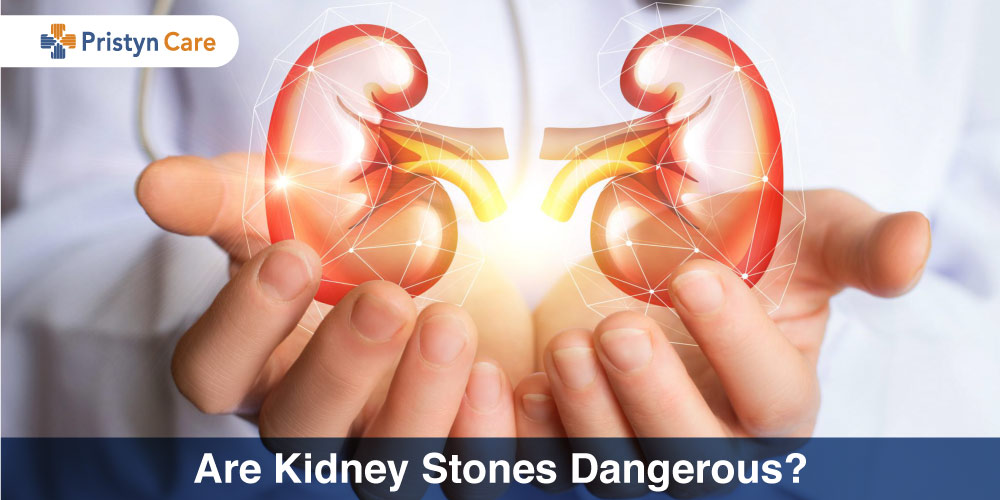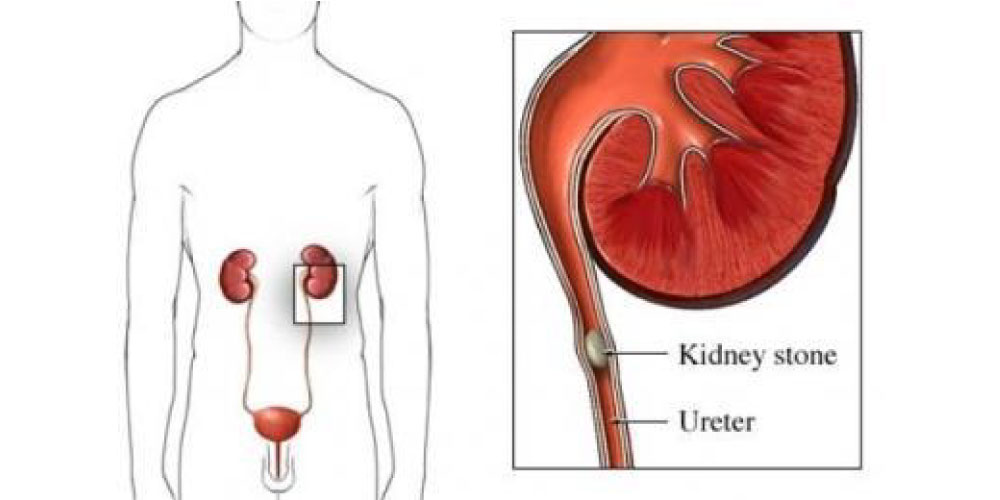![]() Views: 5,994
Views: 5,994
Are Kidney Stones Dangerous?
Dedicated Support at Every Step!
Our Doctors are available 24 hours a day, 7 days a week to help you!
Obesity, high protein diet, excess consumption of salt, and sugar act as a trigger for kidney stones.
Kidney stones are a common health problem that can occur in both the genders, but men are more prone to the risks of kidney stones. Also, people who belong to the age group of 30-60 years have more chances of kidney stones.
We know that kidney stones are fairly common and troublesome. Considering the pain and misery, the question that may pop up in your mind is if these stones are very dangerous?
Well, yes kidney stones can be dangerous in severe cases. If you leave kidney stones unattended or keep on delaying the treatment, it can add up to the dangerous effects of kidney stones on your health.
Let’s look at the dangerous effects of the severe or prolonged condition of kidney stones
- Kidney stones can lead to stinging pain: If a large kidney stone moves into the ureter, there are chances that it may obstruct the ureter. This obstruction can cause severe pain. This stinging pain right below the ribs can even radiate to the lower abdomen and groin area.

- Dangers of catching UTIs due to kidney stones- Whenever a kidney stone creates obstruction in the ureter, it narrows the path of urine flow through it. In such a scenario, the urine formation can add up to the tension on the kidneys. Hence, this increases the chances of developing a UTI due to kidney stones. Catching a UTI because of kidney stones is more common in women than men.
This can be very dangerous if the infection prolongs or recurs. When a UTI due to kidney stones are serious, the person may face high fever along with the damage to the kidneys. - The risk of renal failure- When a person has multiple or large kidney stones, taking them casually can be more dangerous than they would think. Such kidney stones have a tendency to create severe damage in the kidney that may ultimately cause renal or kidney failure. What is more worrisome is that the permanent damage may not even cause any symptoms initially. Thus, it is very necessary to consult a specialist doctor for kidney stones treatment.
- Chronic Kidney Disease (CKD)- It is yet another dangerous complication that can arise due to kidney stones. The term chronic kidney disease means if the damage continues, it will result in permanently stopping the functioning of the kidneys. Although, it is not much common, definitely a serious complication of kidney stones. Other factors such as diabetes, heart disease, and high blood pressure contribute to the factors leading to chronic kidney disease.
- Kidney stones increase the risk of kidney cancer- Kidney stones are often associated with the danger of developing renal cell carcinoma (kidney cancer). Thus, timely treatment of kidney stones is of utmost necessity. It will save you from the dangers of kidney cancer.
Now that you know the dangerous effects of a kidney stone on your health, you can understand how important it is to get proper and timely treatment for kidney stones.
If you are experiencing the troubles of kidney stones, it is better not to wait. Consult a specialist doctor so that you can get the treatment best suited for your case.
No Cost EMI, Hassle-free Insurance Approval
Treat kidney stones in time
If the size of the stone is small, there is a fair chance that the stone will pass out on its own with the urine. It is estimated that a stone of size 4 mm has an 80 percent chance of passing while a stone of 5 mm has a 20 percent chance of passing.
To aid the process of passing the stone, your doctor may prescribe certain medications. These medications work by loosening the muscles of the urinary tract, thereby facilitating the easy removal of small stones. (Also Read: Best medicines for kidney stones)
However, if the size of the stone is greater than 5 mm or if there are multiple stones present on the kidney, the chances of passage are rare and difficult. Larger stones are also associated with more pain and discomfort. Also, with the increase in the size of the stone, the risk of complications also increases.
If you have a large kidney stone, chances are that your urologist will suggest you undergo surgical removal of the stones. Surgical removal of kidney stones is nothing to sweat over, as, with the advancement of technology, more advanced procedures have been developed.
One of the most effective and most widely chosen surgical treatments for kidney stones is Lithotripsy.
Lithotripsy for kidney stones
In Lithotripsy, shock waves are used to break larger stones into smaller ones so that the smaller pieces can easily pass through the urinary tract. These smaller pieces flush out of the body along with the urine.
The entire procedure of Lithotripsy gets completed in less than an hour and you won’t even feel any pain. The procedure is minimally invasive and you can get rid of kidney stones without much discomfort.
If you are experiencing the troubles of kidney stones, it is better to maintain a proactive approach so that serious complications can be avoided.
The modern Lithotripsy procedure is available at Pristyn Care. If your condition requires undergoing lithotripsy, you can contact us. Our medical coordinators will resolve any queries that you have about the procedure and we will be happy to help you lead a safe and complication-free life.
Also Read:
FAQs
Kidney stones are very common. It is estimated that 1 in every 20 people around the world develops kidney stones at some point in time in their life. Although people of any age can have kidney stones, kidney stones are more common in the age group of 30-60 years.
Kidney stones can worsen over time. If left untreated, kidney stones can lead to a number of complications such as:-
- Kidney stones can cause severe pain
- Kidney stones increase the risk of UTIs
- Kidney stones can even lead to kidney failure
- Kidney stones can lead to infections in the kidney
There are a number of techniques available for the treatment of kidney stones. The most modern and effective surgical treatments for kidney stones include laparoscopic treatment, laser treatment and shock wave lithotripsy. However, laparoscopic surgery is considered the best treatment.
Laparoscopic surgery is a surgical technique in which surgery is done through minimal incisions in the body. The technique is also known as Minimally Invasive Surgery or Keyhole Surgery. Laparoscopic surgery is performed with the help of a laparoscope, a thin fiber-optic tube with a miniature video camera on its tip. The surgeon inserts the tube into the body through the small cut or cuts in the skin and the camera images are available on the monitor in the room
There are various benefits of laparoscopic surgery which includes:-
- Less bleeding
- Less pain
- less scarring
- Lower risk of infection
- Shorter stay in the hospital












